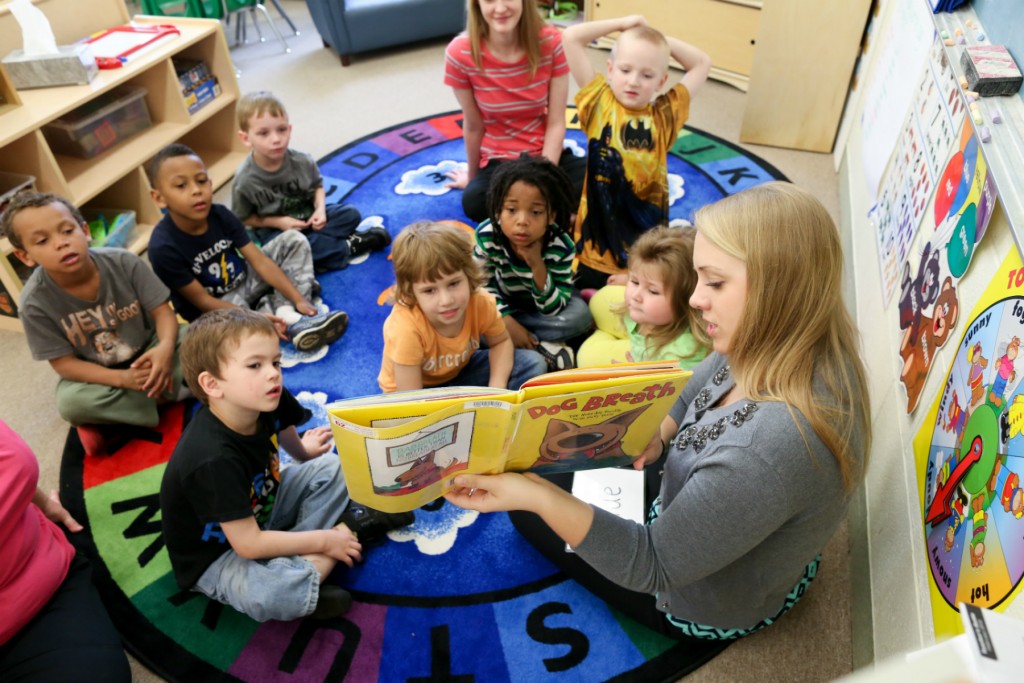
OSU speech language pathology students carried out a pre-K literacy intervention program at Hilltop Preschool to help preschoolers with underdeveloped speech and language skills. Courtesy of Janell Strouse
When Breann Voytko and Kate Seitz first went to Hilltop Preschool in March, the two Ohio State graduate students in speech language pathology had no idea that the pre-K literacy intervention program they were carrying out was going to make a huge difference in these children’s lives in 13 weeks’ time.
From March to May, Voytko and Seitz, together with Ellen Bonk, a retired clinical supervisor at the OSU Speech and Hearing Clinic, went down to Hilltop Preschool every Tuesday and Friday for two hours, helping the preschool students who lagged behind in pre-K literacy skills.
Hilltop Preschool is located in the Hilltop area on the west side of Columbus, one of the poorest areas in central Ohio, housing children from households which are 125 percent below the poverty line, according to the Hilltop Preschool website. In the fall of 2014, about 68 percent of the preschool students at Hilltop were identified as “below average” based on the test results of “Get Ready to Read,” an early literacy screening tool measuring preschool students’ literacy level.
“There (is a lot of research that supports) that children living in poverty tend to be at (a) disadvantage before they even reach kindergarten, and according to our test result, we found that’s true,” said Laura Moehrman, executive director of Hilltop Preschool. “In order for them to be ready for kindergarten, we need to get these kids’ scores back up to where they need to be.”
Fascinated with the literacy intervention program and research done at OSU’s Speech and Hearing Clinic, Moehrman reached out to the clinic, hoping to collaborate and help the children in the Hilltop neighborhood prepare for kindergarten.
“People (are) talking about literacy being ‘king’ because it’s so important in what we do in school and beyond.” said Gail Whitelaw, director of clinical instruction and research at the OSU Speech-Language-Hearing Clinic who administered the Hilltop program. “So the consequences of falling behind in pre-K literacy would be these children go to school ill prepared for being readers.”
Voytko and Seitz said they planned to read books to children and then do activities to help practice literacy skills, following a pre-K literacy curriculum called “Read It Again! Pre-K,” developed by Laura Justice, a professor of speech and hearing at OSU. However, after going into the classroom for the first time, Voytko and Seitz quickly realized they had to make adjustments because the children at Hilltop Preschool were functioning at a lower level and had trouble keeping up with standard textbooks.
“Having never seen these children before, we had all these ideas. And then week two we changed everything,” Seitz said. “So it was a challenge that we had to come in prepared, but after seeing exactly how everyone was doing, you always had to go back and change what you were doing.”
Voytko said managing children in a real classroom setting, rather than a traditional clinical environment and keeping their concentration was another challenge.
“Day one, it was a challenge to even get them to sit in a circle and raise their hands. Not only did we work on literacy skills, but we were working on things that they need to know for their kindergarten, like how to let your friend talk or how to raise your hand if you want to answer questions,” Voytko said. “It takes a lot of patience, but they were so cute and it was fun to be there.”
Seitz said now she thinks the key to all their therapies is to keep classes fun.
“Four-year-olds are never going to sit there and listen if the activities are not fun and interactive. And you yourself need to be excited as well because that also makes them excited and learn better along the way,” she said.
Seitz and Voytko said they ended up enjoying the class time and often had a sense of accomplishment as the children’s language skills improved over time.
“There were certain kids that we saw little ‘aha’ moments in them when they got what we are trying to teach them,” Voytko said. “I think it’s just really cool to see them grow and have these little moments when we know, ‘OK, they’ve got it.’”
After 13 weeks, instead of 68 percent being below average, 70 percent of the preschool students were assessed to be at average or above, with 98 percent of the children showing improvement, Moehrman said.
“It is really remarkable that you can change someone so much in such a short period of time,” Whitelaw said. “And one of the things we would hope to happen is that those gains will be maintained as kids start kindergarten, first grade and second grade. But what we saw was now these kids are much better prepared for kindergarten.”
Moehrman said the OSU Speech-Language-Hearing Clinic and Hilltop Preschool is looking to continue and expand the partnership to benefit more preschool students in the Hilltop neighborhood. If another $10,000 can be raised, Hilltop Preschool will be able to get a new pre-K literacy program.
Whitelaw said she believes that the OSU Speech-Language-Hearing Clinic has a responsibility to disseminate its research results and clinical training to benefit as many people as possible, and the collaboration with Hilltop Preschool has provided a great opportunity to that.
“That is what Ohio State is supposed to be,” Whitelaw said. “We don’t just serve a certain group of people, but the diversity of the state of Ohio was what (interested) us in terms of whatever we can do to make it work.”


